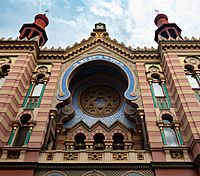Psalm 118 facts for kids
Quick facts for kids Psalm 118 |
|
|---|---|
| "O give thanks unto the LORD; for he is good" | |
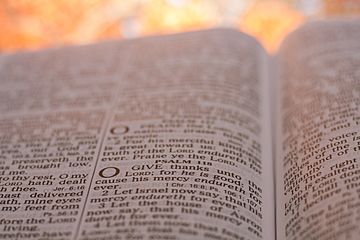
A Bible open to Psalm 118
|
|
| Other name |
|
| Language | Hebrew (original) |
| Psalm 118 | |
|---|---|
|
Psalm 119 →
|
|
| Book | Book of Psalms |
| Hebrew Bible part | Ketuvim |
| Order in the Hebrew part | 1 |
| Category | Sifrei Emet |
| Christian Bible part | Old Testament |
| Order in the Christian part | 19 |
Psalm 118 is the 118th song or prayer in the Book of Psalms. This book is part of the Hebrew Bible and the Christian Old Testament. In some older Bible versions, like the Greek Septuagint and Latin Vulgate, it's called Psalm 117.
The main ideas of Psalm 118 are saying thank you to God and trusting in Him. It teaches us to rely on God's strength, not just our own. This psalm is a regular part of worship for Jewish people, Catholics, Eastern Orthodox Christians, Lutherans, Anglicans, and other Christian groups.
What Does Psalm 118 Say?
This psalm is full of praise and thanks to God. It talks about how good God is and how His kindness lasts forever. The psalm mentions God in almost every verse. It is the last part of a group of psalms called the "Egyptian Hallel," which are sung during important Jewish holidays.
King James Version Text
Here is the text of Psalm 118 from the King James Version of the Bible:
- O give thanks unto the LORD; for he is good: because his mercy endureth for ever.
- Let Israel now say, that his mercy endureth for ever.
- Let the house of Aaron now say, that his mercy endureth for ever.
- Let them now that fear the LORD say, that his mercy endureth for ever.
- I called upon the LORD in distress: the LORD answered me, and set me in a large place.
- The LORD is on my side; I will not fear: what can man do unto me?
- The LORD taketh my part with them that help me: therefore shall I see my desire upon them that hate me.
- It is better to trust in the LORD than to put confidence in man.
- It is better to trust in the LORD than to put confidence in princes.
- All nations compassed me about: but in the name of the LORD will I destroy them.
- They compassed me about; yea, they compassed me about: but in the name of the LORD I will destroy them.
- They compassed me about like bees: they are quenched as the fire of thorns: for in the name of the LORD I will destroy them.
- Thou hast thrust sore at me that I might fall: but the LORD helped me.
- The LORD is my strength and song, and is become my salvation.
- The voice of rejoicing and salvation is in the tabernacles of the righteous: the right hand of the LORD doeth valiantly.
- The right hand of the LORD is exalted: the right hand of the LORD doeth valiantly.
- I shall not die, but live, and declare the works of the LORD.
- The LORD hath chastened me sore: but he hath not given me over unto death.
- Open to me the gates of righteousness: I will go into them, and I will praise the LORD:
- This gate of the LORD, into which the righteous shall enter.
- I will praise thee: for thou hast heard me, and art become my salvation.
- The stone which the builders refused is become the head stone of the corner.
- This is the LORD's doing; it is marvellous in our eyes.
- This is the day which the LORD hath made; we will rejoice and be glad in it.
- Save now, I beseech thee, O LORD: O LORD, I beseech thee, send now prosperity.
- Blessed be he that cometh in the name of the LORD: we have blessed you out of the house of the LORD.
- God is the LORD, which hath shewed us light: bind the sacrifice with cords, even unto the horns of the altar.
- Thou art my God, and I will praise thee: thou art my God, I will exalt thee.
- O give thanks unto the LORD; for he is good: for his mercy endureth for ever.
Important Verses in Psalm 118
Some verses in Psalm 118 are very well-known and have been used in many ways.
Verse 5: Finding Freedom in Trouble
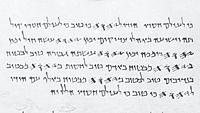
The verse says: "I called on the Lord in distress; The Lord answered me and set me in a large place." This means that when someone was in a lot of trouble or felt trapped, they called out to God. God answered them and gave them freedom or a safe, open space. Many translations say God "set me free."
Verse 14: God, My Strength and Song
This verse states: "The Lord is my strength and song, And He has become my salvation." These words are also found in other parts of the Bible, like the Song of Moses in the book of Exodus and in the book of Isaiah. They show that God gives strength and joy, and He saves people.
Verse 22: The Rejected Stone
The verse says: "The stone which the builders rejected Has become the chief cornerstone." This is a famous saying. It means that something or someone that was thought to be unimportant or useless became the most important part. A "cornerstone" is the main stone that holds a building together.
Verse 23: God's Amazing Work
Following the idea of the rejected stone, verse 23 says: "This was the Lord’s doing; It is marvelous in our eyes." This means that the amazing things that happen, especially when something unexpected becomes very important, are God's work. People are often surprised and impressed by these events.
Verse 24: A Day to Celebrate
This verse is often quoted: "This is the day which the LORD hath made; we will rejoice and be glad in it." It's a call to celebrate and be happy on any day, because every day is a gift from God.
How Psalm 118 is Used
In Judaism
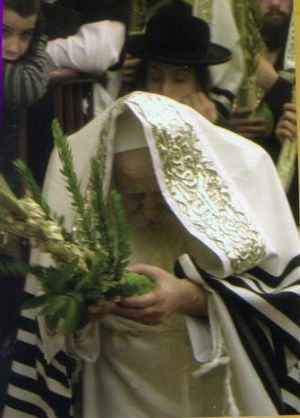
Psalm 118 is a very important part of Jewish prayers. It is the last of six psalms (113-118) that make up the Hallel. The Hallel is recited on special holidays like Passover, Shavuot, and Sukkot. On these days, Psalm 118 is read completely, and the last ten verses are even read twice.
- Verse 24 might be the inspiration for the famous Israeli song Hava Nagila.
- Verse 25 is part of a prayer called Tachanun, which is said on Mondays and Thursdays.
- Verse 27 is the source for the name of the holiday isru chag.
In Christianity
Many parts of Psalm 118 are quoted in the New Testament of the Christian Bible.
- Verse 6 is found in the book of Hebrews (Hebrews 13:6).
- Verses 22-23, about the "rejected stone" becoming the "cornerstone," are quoted by Jesus himself in the book of Matthew (Matthew 21:42). This shows that even when things are difficult, God will bring salvation. These verses are also mentioned in Mark (Mark 12:10), Luke (Luke 20:17), Acts (Acts 4:11), and 1 Peter (1 Peter 2:4,7).
- When Jesus made his triumphal entry into Jerusalem, crowds welcomed him by quoting verses 25-26: "Blessed is he who comes in the name of the Lord!" This is found in Matthew (Matthew 21:9, 23:39), Mark (Mark 11:9-10), Luke (Luke 13:35, 19:38), and John (John 12:13).
In the Catholic Church
Saint Benedict chose Psalm 118 to be sung during Sunday morning prayers around the year 530. Today, it is still read in Catholic services every Sunday during certain weeks. Psalm 118 is also strongly connected to Easter in the Catholic Church. It is often sung during the Easter Vigil and on Easter Sunday morning.
In Anglicanism
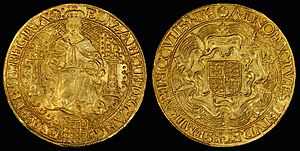
A part of verse 23 from the Latin version of the Bible is written on some old English coins. When Elizabeth I of England became queen, she is said to have spoken this same verse in Latin.
In Music
A German hymn called "Nun saget Dank und lobt den Herren" is based on Psalm 118. Many composers have written music for this hymn.
 | Calvin Brent |
 | Walter T. Bailey |
 | Martha Cassell Thompson |
 | Alberta Jeannette Cassell |


